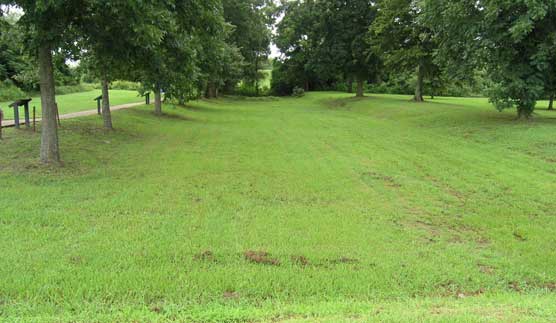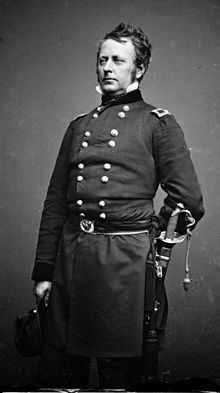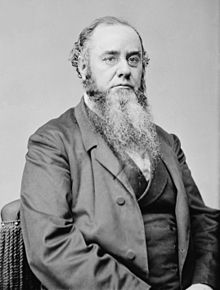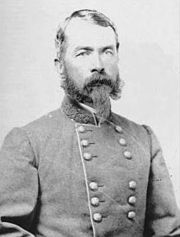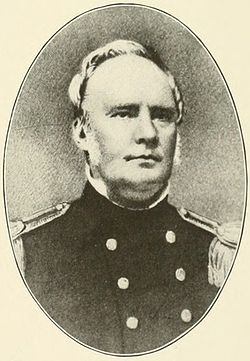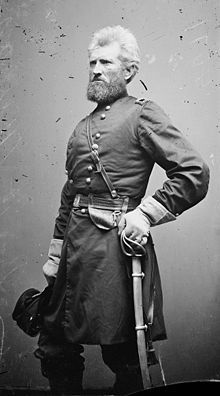 |
| Area of Burnside's Planned Flanking Movement (Google Earth) |
HEADQUARTERS ARMY OF THE POTOMAC,
January 20, 1863-11.45 p.m.
Major General E. V. SUMNER,
Commanding Right Grand Division:
GENERAL: Inclosed please find instructions given to the generals
commanding the other two grand divisions, all of which explain
themselves. The Ninth Army Corps will not be required to move at 4
o'clock to-morrow morning, as designated by my previous orders, but will
be in readiness to move as soon as orders are received. I will see you
at your headquarters at a very early hour to-morrow morning. When the
Ninth Corps moves, it should follow the road in rear of Couch's corps.
Mr. Cushing, of your staff, is conversant with the roads. The probable
time which it will be required to start will be 6.30 o'clock. I have
placed all the cavalry at these headquarters at the disposal of General
Pleasonton, and have instructed him to keep his command in hand, ready
to start at a moment's notice, subject to your orders or my own.
I have the honor to be, very respectfully, yours,
A. E. BURNSIDE,
Major-General, Commanding.
[Sub-inclosure No. 1.]
HEADQUARTERS ARMY OF THE POTOMAC,
January 20, 1863.
Major General WILLIAM B. FRANKLIN,
Commanding Left Grand Division:
GENERAL: Your place of crossing will be at a point just below Banks'
Ford, over the pontoon bridges to be constructed by General Woodbury.
The commanding general directs that you will please have one division of
your command ready to accompany an aide-de-camp of General Woodbury,
who will report to you at 11 a.m. to-day, and will conduct it to a place
of bivouac for the night. This division will assist in getting the
pontoons down to the river, under the direction of an engineer officer,
at an early hour to-morrow, and then will be thrown across the river in
pontoons, with a view to holding the opposite bank while the two bridges
are being built. The remainder of your command will please move in such
manner as to have the head of your column at the place of crossing at
7.30 o'clock to-morrow morning, and have them so concentrated as to have
a continuous column crossing the bridge. If we succeed in crossing, you
will please move your command with a view to seizing the heights
immediately above the crossing and holding the Fall Hill road, which
leads from Fredericksburg, in front of Dr. Taylor's
house, to the Plank road. If this work should be accomplished, you will,
immediately after connecting with General Hooker on your right, throw
your right flank forward to a point on the other side of the Plank road,
designated on the map as Guest's, accomplishing which it is presumed
the heights in front of the town will be evacuated by the enemy. General
Hooker will be ordered to keep your right well supported, and General
Sumner will be ordered to follow you immediately over the bridges. The
plan spoken of last night is so far modified as to do away with the
probability of the throwing of a bridge below your crossing for General
Sumner's command, and he will follow you in reserve. I state this
because engineers think that a bridge cannot be thrown at that place. An
attempt will be made, and it is possible that Taylor's Heights may be
taken by Sumner's infantry. You may be sure that everything will be done
to accomplish it that can be. Many of the details of this plan were
talked over last night, but if there are any other points on which you
desire information, he will be glad to give it you. He takes it for
granted your topographical engineers have been informed by Mr. Brown of
the route to be pursued by your columns. He will be in communication
with you during the day, and will endeavor to give you such orders as
the emergencies may require.
I need not impress upon you the importance of a most vigorous attack.
General Gregg will maintain his line of pickets below, and will hold
himself in readiness in rear of your column, at such place as you may
designate, to move at short notice in such direction as he may be
required. The general commanding is of the opinion that a point between
your headquarters and his, in a sheltered position, will be a proper
place for him, as General Gregg can be reached by telegraph from
headquarters. If such is the disposition, please instruct him to have an
orderly in waiting at the telegraph office.
I have the honor to be, very respectfully, your obedient servant,
JNO. G. PARKE,
Chief of Staff.
[Sub-inclosure No. 2.]
HEADQUARTERS ARMY OF THE POTOMAC,
January 20, 1863-1 a.m.
Major-General HOOKER,
Commanding Center Grand Division:
GENERAL: Your place of crossing will be at a point just above Banks'
Ford instead of United States Ford. The commanding general directs you
will please have one division of your command ready to accompany an
aide-de-camp of General Woodbury, who will report to you at 11 a.m.
to-day, and will conduct it to a place of bivouac for the night. This
division will assist in getting the pontoons down to the river, under
the direction of the engineer officer, and will then be thrown across
the river in pontoons, with a view to holding the opposite bank while
the bridges are being built. The remainder of your command you will
please move in such manner as to have the head of your column at the
place of crossing at 7.30 a.m. on the 21st. General Franklin crosses at a
point a mile below you. The aide of General Woodbury will designate to
you on the map your place of crossing. Definite written instructions
will be given you to-morrow as to your movements when across the river.
Very respectfully, your obedient servant,
JNO. G. PARKE,
Chief of Staff.
[Sub-inclosure No. 3.]
HEADQUARTERS ARMY OF THE POTOMAC, January 20, 1863-10.45 p.m.
Major-General HOOKER,
Commanding Center Grand Division:
GENERAL: In addition to the orders already give you, the following will
be for your guidance, if you succeed in crossing your command at the
designated place: You will, if possible, seize the heights upon which
Decker's house is situated, occupying at the same time the wooded ground
above it. The bridge over Mott Run, near the foot of Decker's Hill,
should be secured as early as possible, and held either under the guns
of the battery or by an infantry force. You will readily see the
importance of securing this bridge, as it will be the only rapid means
of communication between yourself and General Franklin. These two points
having been occupied, you will extend your command as much to the right
and front as possible, keeping your advanced line well supported. The
Plank road is some 2 1/2 miles from Decker's house, and it is very
desirable to secure a position on that road at or in advance of Salem
Church, which is about three-quarters of a mile from the intersection of
the Fall Hill road with the Plank road. The Fall Hill road is the one
that runs up the river from Fredericksburg until it reaches a point
opposite Falmouth, when it bears to the left, and, passing Dr. Taylor's
house, intersects the Plank road at Morrison's. General Franklin is
ordered, after crossing, to secure the heights above his crossing, and
afterward Taylor's Heights, and, in case he is successful, to extend his
right to the neighborhood of Guest's house. You will please hold
yourself in readiness to support his right, and, in case the enemy
should vacate the heights in his front, it may be advisable to throw
your force down the old Mine road to the Telegraph road. This road is
wrongly laid down on the map; it is nearer Fredericksburg than the map
represents. It may be well to state that there is an infantry and
cavalry force in the vicinity of the United States Ford that needs
watching. I have attached to General Averell another regiment, 1,000
strong, and have relieved a portion of his pickets. He is subject to
your order, having simply received orders from me to remain at Potomac
Creek, ready to move at a moment's notice, when ordered by you or
myself. It having been reported by Captain Comstock that the crossing
below General Franklin's, ordered for General Sumner's command, is
impracticable, I have ordered General Sumner to hold his two corps in
readiness to follow you and General Franklin. I shall, however, attempt
to throw a bridge at that place for footmen, at least.
These instructions may be materially modified by the events of tomorrow,
during which day I hope to be in frequent personal communication with
you. I need not say to you that this attack upon the enemy should be a
vigorous one. My headquarters will be at Wroton's house until 8 a.m. An
aide will be sent to communicate with you. I will send you a guide
before you commence your movement across the river tomorrow morning.
I have the honor to be, very respectfully, your obedient servant,
A. E. BURNSIDE,
Major-General, Commanding.
Official Records, Series I., Vol. 21, Part 1, Pages 78-80.
At the battle of Fredericksburg Burnside had planned to seize a point on the Confederate right near Hamilton's Crossing in order to force away the strongly posted forces on Marye's Heights.
His new plan was to cross at Banks Ford and Motts Run and move against the Confederate left by way of the Plank Road, securing Taylor Hill (on the heights dominating the town from the west) while working their way back toward town.


